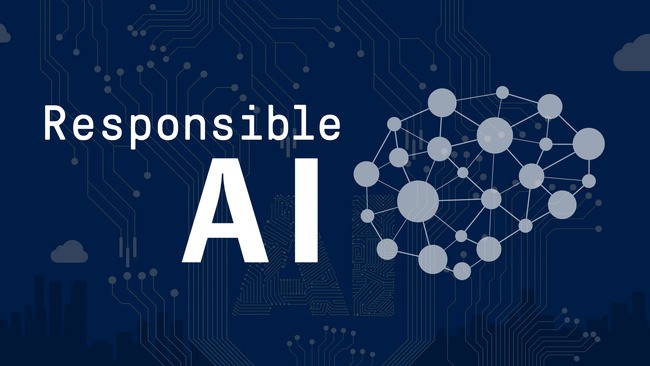Responsible AI: A Guide to Ethical Artificial Intelligence

Strong 8k brings an ultra-HD IPTV experience to your living room and your pocket.
Artificial Intelligence (AI) has rapidly transformed industries, from healthcare to finance, revolutionizing how businesses operate and improving the lives of millions globally. However, as AI becomes more pervasive, the ethical implications of its use are garnering attention. To ensure AI systems are developed and deployed responsibly, businesses and developers must embrace the principles of ethical artificial intelligence.
In this article, we will explore the concept of responsible AI, the importance of AI ethics, and tools such as AI audits that help ensure AI technologies align with ethical standards. We'll also introduce the role of platforms like EthosAI in promoting responsible AI practices.
Understanding Responsible AI
Responsible AI refers to the development, deployment, and use of AI systems in a way that is transparent, accountable, fair, and ethical. As AI systems become more complex, the need to address potential risks like bias, discrimination, and privacy concerns grows. Responsible AI frameworks focus on mitigating these risks while ensuring the benefits of AI are accessible and equitable.
Key Principles of Responsible AI
1. Transparency: AI systems must be transparent about how decisions are made. This ensures users understand the logic behind automated decisions, especially in critical areas such as healthcare, legal, and finance.
2. Accountability: Developers and organizations using AI should be accountable for the decisions made by their systems. This includes identifying potential biases, ensuring models are tested rigorously, and being open to external AI audits.
3. Fairness: AI systems should be designed to treat all individuals fairly, without perpetuating societal biases. This requires developers to actively seek out and eliminate biases from data sets and algorithms.
4. Privacy: Respect for users’ privacy is crucial in responsible AI. Systems should not compromise the privacy of users and should follow relevant data protection regulations, such as GDPR.
5. Inclusiveness: Responsible AI should promote inclusivity by being accessible to all, regardless of socio-economic or cultural background.
Why Ethical AI Matters
The ethics of AI directly impact the credibility, trustworthiness, and long-term sustainability of AI technologies. Inappropriate use of AI can lead to unintended consequences, including biased decision-making, privacy violations, and widening inequality.
For example, facial recognition technology has been scrutinized for racial biases. If AI models are trained on biased datasets, they may incorrectly identify people of color more frequently, perpetuating inequality. Ethical AI seeks to address these challenges, ensuring that AI systems do not contribute to discrimination or unfair practices.
In addition to addressing biases, ethical AI also involves ensuring data privacy and protecting individuals’ personal information. With the increased use of AI in sectors like finance and healthcare, privacy concerns are paramount. Ethical guidelines, such as those proposed by platforms like EthosAI, ensure that AI systems adhere to privacy standards while delivering the best possible outcomes for users.
The Role of AI Audits
One effective way to maintain responsible AI practices is through AI audits. An AI audit is a comprehensive assessment of an AI system’s design, data sources, and decision-making processes to ensure that they comply with ethical and regulatory standards. These audits play a vital role in building trust between developers, businesses, and end-users.
AI audits typically focus on several key areas:
1. Bias Detection: Identifying and addressing any biases present in AI models or datasets.
2. Algorithmic Transparency: Ensuring that decision-making processes are understandable and traceable.
3. Compliance with Regulations: Ensuring that AI systems comply with relevant laws and industry-specific standards.
4. Data Privacy: Assessing how well an AI system protects sensitive data and adheres to privacy regulations.
By implementing regular AI audits, organizations can ensure their AI systems remain fair, transparent, and aligned with ethical standards.
The Rise of EthosAI: Fostering Ethical AI
As AI adoption grows, so does the need for platforms that promote ethical and responsible AI practices. One such platform is EthosAI, a tool designed to help organizations integrate ethical standards into their AI systems. EthosAI provides guidance on responsible AI, focusing on transparency, fairness, and accountability. By conducting AI audits, it helps organizations assess the ethical implications of their AI technologies and ensures that they operate within an ethical framework.
Platforms like EthosAI serve as valuable resources for companies looking to navigate the complex landscape of AI ethics. By utilizing these tools, businesses can identify potential risks early on, reduce biases, and ensure compliance with evolving regulations.
How to Implement Responsible AI
To successfully implement responsible AI, businesses and developers should adopt a multi-faceted approach that includes:
1. Developing Ethical Guidelines: Establish clear ethical guidelines for AI development, covering transparency, fairness, and accountability.
2. Bias Mitigation: Regularly audit AI systems to detect and address biases in data sets and algorithms.
3. Data Privacy Protection: Prioritize user privacy and ensure compliance with regulations such as GDPR.
4. AI Audits: Use AI audits to evaluate the ethical performance of AI systems and ensure they align with responsible AI standards. Platforms like EthosAI can support organizations by conducting comprehensive audits.
5. Stakeholder Engagement: Engage with a wide range of stakeholders, including users, regulators, and developers, to ensure diverse perspectives are considered when designing AI systems.
The Future of Responsible AI
As AI continues to evolve, the importance of responsible and ethical AI will only increase. The future of AI lies in systems that are not only innovative but also aligned with human values. In the coming years, we can expect more regulations and guidelines focused on ethical AI, increased transparency in AI decision-making, and widespread adoption of AI audits as part of regular business practices.
Responsible AI ensures that technology serves society positively, benefiting everyone equitably. Businesses that prioritize ethical AI, utilizing tools like EthosAI and conducting regular AI audits, will be better positioned to thrive in a future where trust in technology is essential.
Conclusion
The push for ethical and responsible AI is no longer optional—it’s a necessity. As AI becomes more integrated into daily life, ensuring that it is developed, deployed, and used responsibly is critical. By adhering to key principles of responsible AI, conducting regular AI audits, and embracing platforms like EthosAI, organizations can foster AI systems that are fair, transparent, and accountable.
Ethical AI not only benefits society but also builds trust, ensuring that AI innovations continue to improve our lives without compromising our values.
Note: IndiBlogHub features both user-submitted and editorial content. We do not verify third-party contributions. Read our Disclaimer and Privacy Policyfor details.







